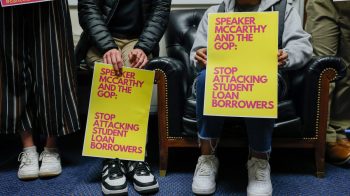Is the ratings agency model broken?
JEREMY HOBSON: Now let’s get to the debt ceiling debate in Washington. The House is working this week on Tea-party backed plan that would raise the debt ceiling in exchange for steep cuts. That plan appears to have no chance of passing the Senate. The Senate, meanwhile, is working on a plan that would give President Obama the authority to raise the debt ceiling without help from Congress.
But the rating agency S&P says without a big deal of long term deficit reduction, they’re going to downgrade the U.S.’s credit rating even if the debt ceiling is raised.
For more, let’s bring in Julia Coronado, chief economist with the investment bank BNP Paribas. She’s with us live from New York.
JULIA CORONADO: Good morning.
HOBSON: Well, do you think Julia that S&P would really follow through and downgrade the U.S.?
CORONADO: Well, S&P has sort of painted itself into a bit of a corner. It’s taken a strong stance. It said that it’s not about just a debt ceiling and raising the debt ceiling but about getting some longer term fiscal credibility in place. And given what’s happening in Washington, that’s looking less likely. Now they’ve given themselves a bit of wiggle room in terms of the timing, but I think it’s in some sense just a matter of time before they’re forced to make good on their promise and downgrade the U.S.
HOBSON: And what kind of effect would a downgrade have?
CORONADO: Well, you might think that ratings agency moves like this aren’t news — that we already know whatever S&P knows. But on the other hand, there’s a lot of structures and financial markets built around these ratings. So for example, some funds that are tied to S&P ratings could be forced to liquidate their treasury portfolios if they follow through with the downgrade and that could lead to some disorderly conditions in financial markets.
HOBSON: And Julia, the S&P — that rating agencies like S&P — Moody’s, and Fitch famously made some big mistakes with mortgage-backed securities ratings leading up to the financial crisis. Why is it that they have such credibility still?
CORONADO: Well, I think that this is a story of human frailties. This is inertia at work. While we all learned during the financial crisis that the rating agency model is basically broken, there’s so much built around it — so many structures, just the way we do business is built around these ratings that we just didn’t move away from it even despite the crisis. And so here we are again with another uncomfortable situation that could end up biting us a little bit.
HOBSON: Julia Coronado, chief economist with the investment bank BNP Paribas, thanks so much as always.
CORONADO: My pleasure.
There’s a lot happening in the world. Through it all, Marketplace is here for you.
You rely on Marketplace to break down the world’s events and tell you how it affects you in a fact-based, approachable way. We rely on your financial support to keep making that possible.
Your donation today powers the independent journalism that you rely on. For just $5/month, you can help sustain Marketplace so we can keep reporting on the things that matter to you.


















